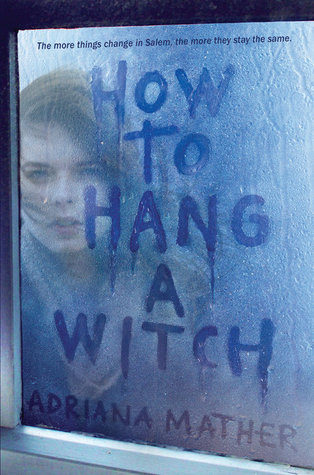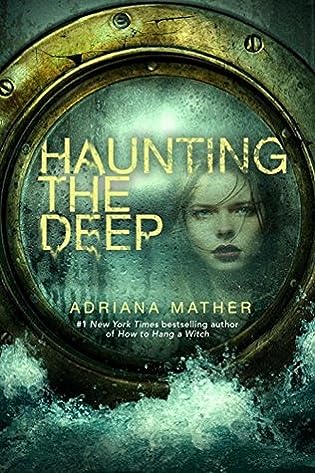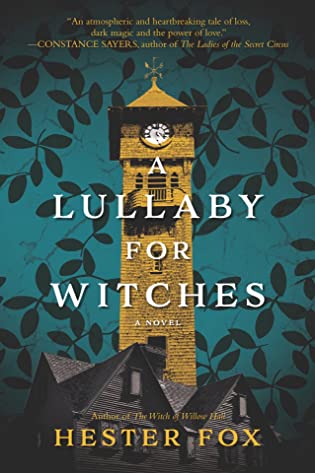I discovered Adriana Mather’s book through the Salem Witch Museum. The museum is terribly cheesy, but they have a good social media presence, and they recently shared a picture on Facebook of books written by Salem Witch Trials descendants that are available in their gift shop. I’m not sure if Adriana Mather is a direct descendant of Cotton Mather, but she’s definitely related. Cotton Mather notoriously played a role on the wrong side of history in the infamous Salem Witch Trials. I’m not sure if Adriana Mather plans to write more books in this series, but I’d read them. I think a good description of these books might be Twilight, but with witches and ghosts instead of vampires. I will read practically anything set in Salem. I’ve spent a good bit of time there and know it fairly well. It is a cute little town that takes its history in weird, kitschy directions. One caveat I feel like I must share: it’s not weird at all in New England to be a descendant of one or even several of the players in the Salem Witch Trials, and it bugged me a bit that the notion of being descended from an accused witch or other players in the trials was somehow unique enough to set “the Descendants” apart. But if you lay that quibble aside, the idea of them wafting through the hallways of Salem High School wearing black from head to toe is fun. Adriana Mather has a fascinating family history, and she was lucky to be able to mine it for her fiction.
 How to Hang a Witch (How to Hang a Witch, #1) by Adriana Mather
How to Hang a Witch (How to Hang a Witch, #1) by Adriana Mather Series: How to Hang a Witch #1
Published by Knopf on July 26, 2016
Genres: Contemporary Fiction, Young Adult
Pages: 359
Format: E-Book, eBook
Source: Library
Buy on Amazon, Buy on Bookshop
This post contains affiliate links you can use to purchase the book. If you buy the book using that link, I will receive a small commission from the sale.
Goodreads
It's the Salem Witch Trials meets Mean Girls in a debut novel from one of the descendants of Cotton Mather, where the trials of high school start to feel like a modern day witch hunt for a teen with all the wrong connections to Salem’s past.
Salem, Massachusetts is the site of the infamous witch trials and the new home of Samantha Mather. Recently transplanted from New York City, Sam and her stepmother are not exactly welcomed with open arms. Sam is the descendant of Cotton Mather, one of the men responsible for those trials and almost immediately, she becomes the enemy of a group of girls who call themselves The Descendants. And guess who their ancestors were?
If dealing with that weren't enough, Sam also comes face to face with a real live (well technically dead) ghost. A handsome, angry ghost who wants Sam to stop touching his stuff. But soon Sam discovers she is at the center of a centuries old curse affecting anyone with ties to the trials. Sam must come to terms with the ghost and find a way to work with The Descendants to stop a deadly cycle that has been going on since the first accused witch was hanged. If any town should have learned its lesson, it's Salem. But history may be about to repeat itself.
I believe this book is the stronger of the two, but that’s partly because Samantha Mather, the protagonist, is more of an outsider, and all the world-building in this book is pretty interesting.
 Haunting the Deep (How to Hang a Witch, #2) by Adriana Mather
Haunting the Deep (How to Hang a Witch, #2) by Adriana Mather Series: How to Hang a Witch #2
Published by Knopf on October 3, 2017
Genres: Contemporary Fiction, Historical Fiction, Young Adult
Pages: 344
Format: E-Book, eBook
Source: Library
Buy on Amazon, Buy on Bookshop
This post contains affiliate links you can use to purchase the book. If you buy the book using that link, I will receive a small commission from the sale.
Goodreads
The Titanic meets the delicious horror of Ransom Riggs and the sass of Mean Girls in this follow-up to the #1 New York Times bestseller How to Hang a Witch, in which a contemporary teen finds herself a passenger on the famous “ship of dreams”—a story made all the more fascinating because the author’s own relatives survived the doomed voyage.
Samantha Mather knew her family’s connection to the infamous Salem Witch Trials might pose obstacles to an active social life. But having survived one curse, she never thought she’d find herself at the center of a new one.
This time, Sam is having recurring dreams about the Titanic . . . where she’s been walking the deck with first-class passengers, like her aunt and uncle. Meanwhile, in Sam’s waking life, strange missives from the Titanic have been finding their way to her, along with haunting visions of people who went down with the ship.
Ultimately, Sam and the Descendants, along with some help from heartthrob Elijah, must unravel who is behind the spell that is drawing her ever further into the dream ship . . . and closer to sharing the same grim fate as its ghostly passengers.
I said I’d read anything set in Salem, and I’m also a sucker for books about Titanic, though, to be honest, I’m not sure I’ve read a good one. I liked the movie when it came out, and I used to play a video game set there that was a ton of fun. I figured out who the antagonist in this book would be early on, but their motive doesn’t make a ton of sense to me.
 Weyward by
Weyward by 
 A Lullaby for Witches by
A Lullaby for Witches by 